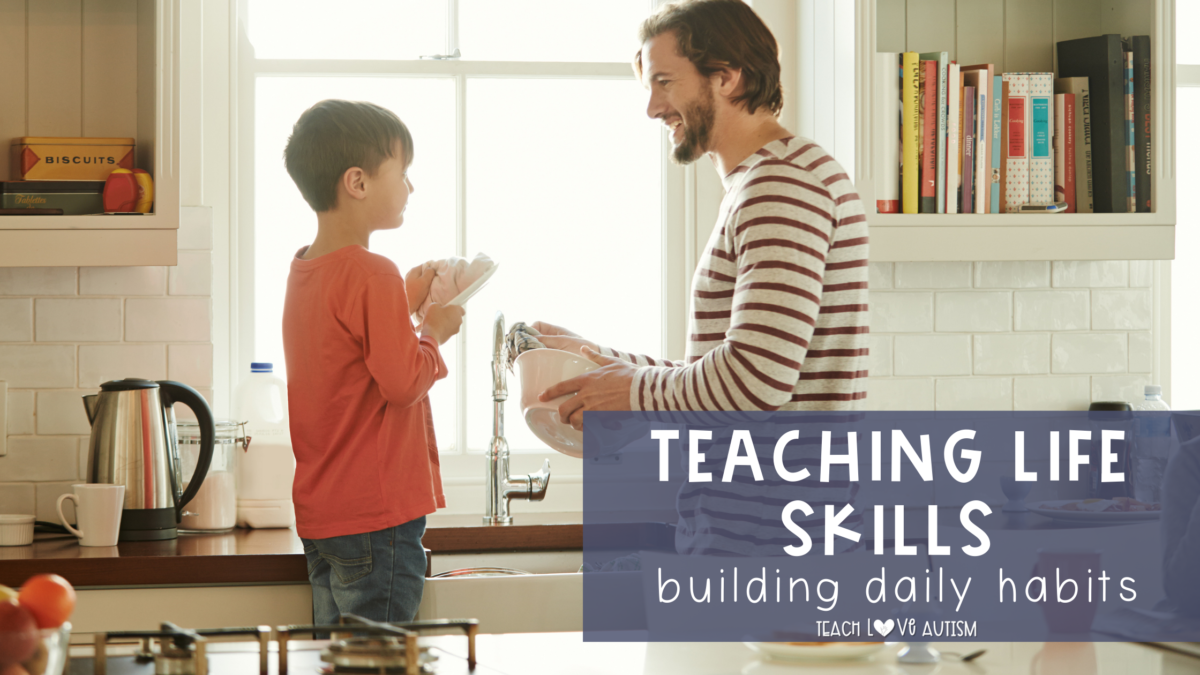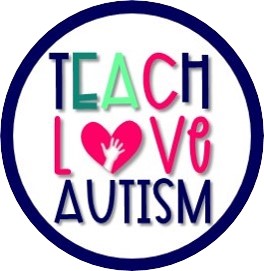Teaching Life Skills for Kids
Sharing is caring!

Featured guest blogger: Michelle Hays, a special education teacher who loves teaching life skills for kids, and can be found on her website Hey Mrs. Hays.
My job as an early childhood special education teacher is to understand parent’s hopes and visions for their special needs child. This includes teaching life skills. This helps me bridge the gap between home and school. Then we can work collaboratively towards a common goal for the child.
Recent research shows happiness is derived from within (intrinsically) and not so much from outside stimuli (such as possessions or recognitions). One of the big factors that contribute to happiness is being engaged in meaningful work.
We, as special needs parents, are facilitators of our child’s experiences. As a special needs parent myself, I am often tempted to save my daughter from experiencing the pain and frustration of facing difficult challenges. I often find myself making things simple for her because she “has it hard enough as it is.” Sometimes I believe this excuse will make life simpler for her or me. Nevertheless, by not allowing her to practice a skill and face the frustration, I end up short-changing her in the end. Meaningful work derives satisfaction once it is completed.
I find other parents in the attempt to protect the child from failure. This means becoming over-involved in the process of their child’s natural development. Like anything in life, change comes from our mindset, not actions. Changing a child’s future starts with mentality.
Getting Started Isn’t Always Easy
Walking the special needs path is like walking a tightrope, with constant assessing and adjusting as each step is made. Even the smallest decisions can seem big. Special needs parenting is hard, and each situation is unique. There is an ongoing alignment as situations move forward, backward, or just even- the standstill.
Hovering to provide more support than the child needs can actually do more harm than good. Want to learn more about the IEP MEetings and process? Check out this blog post! Living with a special need does not discredit the child from having his own ability. It also does not take away the basic human need of maturing and developing.

Every victory, big or small, gives joy in the sense of our own accomplishment. Large achievements are never one single thing, rather a set of many small skills that at times may appear insignificant.
While our help comes from a heart full of love (and sometimes guilt), they can also get in the way of the child’s sense of fulfillment. They need to discover how to live to his fullest potential, by using his own strengths and abilities.
Mastering a skill, developing a habit, learning a hobby, and contributing to the community, all make up part of that intrinsic motivation that fills a person with happiness.
When to Start Teaching Life Skills for Kids
It’s hard to imagine that our child is on a path to adulthood. Given the challenges, it might be tempting to think that she will be a “forever baby” and that our life span as parents will be as long as she needs it to be. However, it is important that we accept that we will not be able to live her life for her.
This is why teaching life skills is so crucial. Things like personal care, socialization, recreation, communication, self-advocacy, and critical thinking skills make up part of learning to grow as independently as possible. Teaching life skills for kids can take a lifetime to learn, and they start with the home environment.
As a special education teacher, I study behavior to help shape it. A big motto in my field of work is “you can’t control the behavior, but you can shape the environment.”
Parents are the thermostat of the home. However, it is not just the attitudes that create an atmosphere in the home. Daily habits and lifestyles that shape the environment that is created for the family.
Why Teaching Life Skills for Kids is Important
It is important to be forward-thinking in day-to-day living. Be mindful of this as you turn habits and routines into daily opportunities. These will allow the child to gain those precious life skills that will bring that inner joy.
There is a vast world of skills to teach, and plenty of adjustments, modifications, and accommodations that make each individual situation a world of its own. It is a tremendous ground to cover and while not all of it is within your grasp, small victories can be made with each forward step. As Demond Tutu said, “there is only one way to eat an elephant: one bite at a time.”

When you’re teaching life skills for kids that struggle to learn it, you can only approach it as if trying to eat the elephant one bite at a time. Start somewhere where there is already an interest and challenge your child just a little further.
When teaching life skills for kids try the following strategies:
Model- demonstrate the task yourself and have your child try it on her own
Break it down- Think of all the small parts that it takes to do a task and teach one piece at a time
Make it visual- create a visual step by step guide to follow
Backward chaining- Start the activity, let him finish.
Forward chaining- Let her start the task and help her complete the final steps.
Looking for some ideas and materials for teaching life skills? Check out some of these!
You can check these out and more in my shop!
WWW.teachloveautism.com
A Recap on Our Topic:
Be mindful of how much support you are giving and try to slowly fade out of the picture as your child gains confidence. Additionally, try to teach the skill in the natural setting. For example, if the skill is putting on shoes, make sure that you do it when you are planning an outing (and allow plenty of time)!
Some days are easier than others, but such is life! Don’t be discouraged on those days where nothing seems gained or when progress is slow. Persist and try again next time. Or perhaps, try another skill altogether! Remember that all forward motion counts, and each step taken, no matter how small, is progress.

Michelle Hays is a digital media producer of “Hey! Mrs. Hays!” an educational YouTube channel for preschool children. She is the writer and producer and creator of “The Journey,” a podcast targeted for parents of individuals with special needs. Michelle Hays is a Special Education Teacher, specializing in Early Childhood intervention. She is also mother to a special needs teenager with multiple disabilities.






